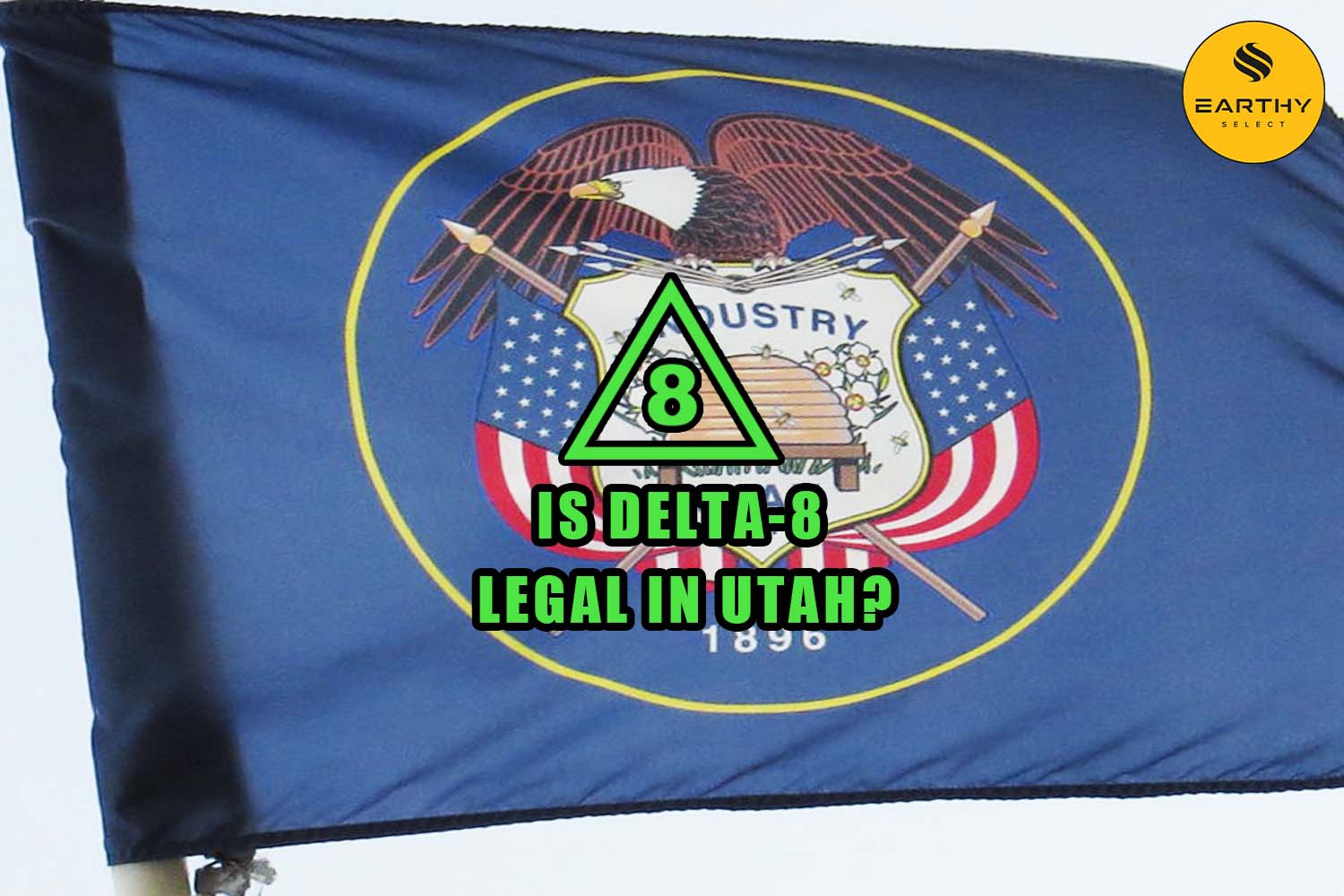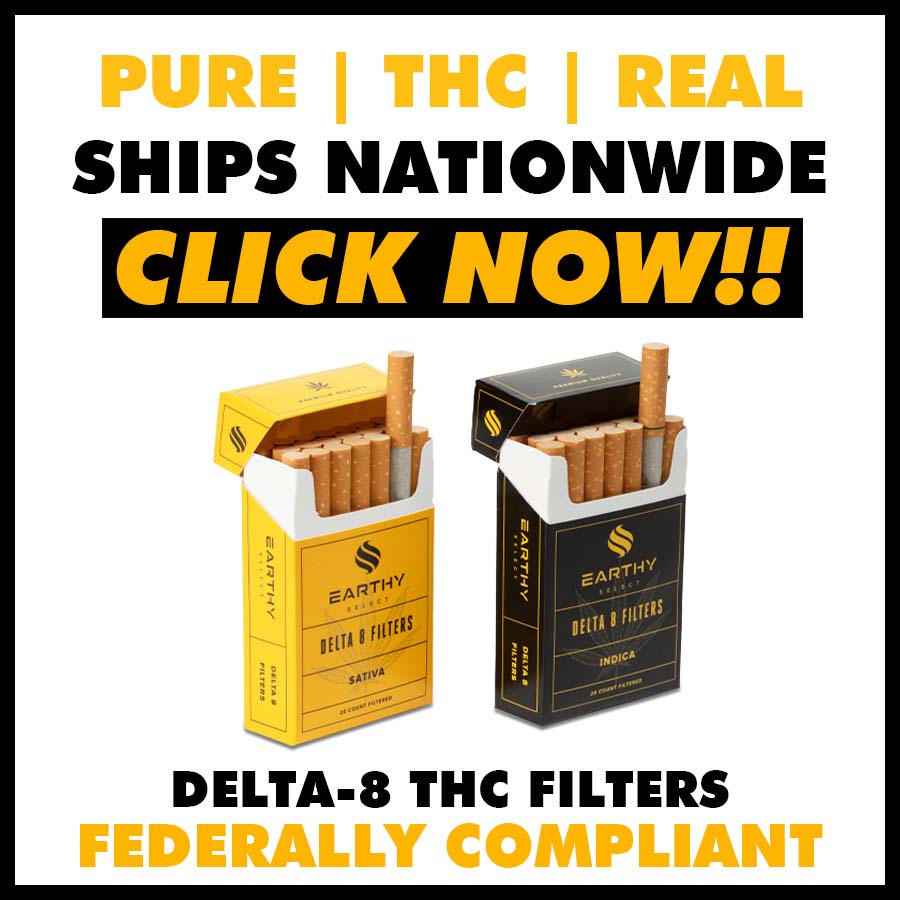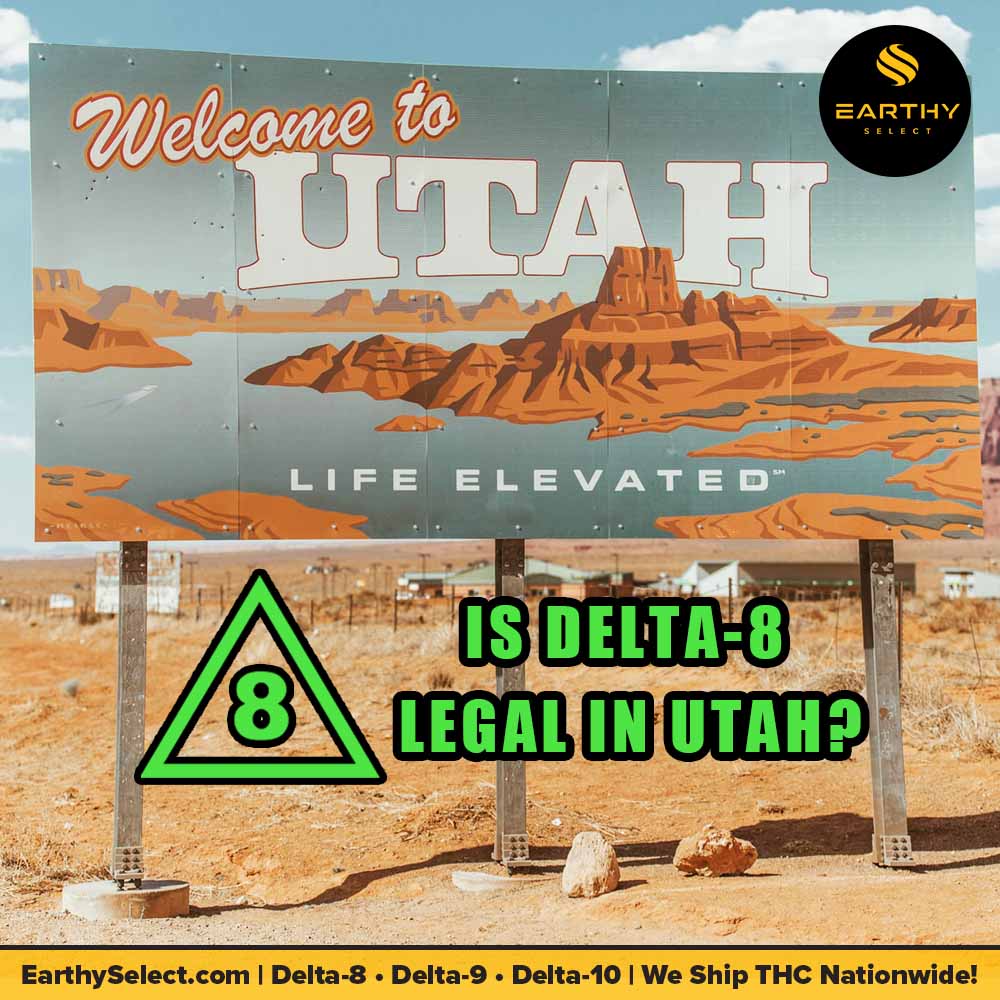Is Delta-8 legal in Utah?
Hemp-derived Delta-8 THC is federally compliant with the Farm Bills and questionably allowed under Utah state law. Delta-8 has earned itself a great reputation in the modern cannabis market, offering a federally legal high, even in states that have not adopted medical or recreational legislation. This article will discuss Delta-8, its legal status and the Bee Hive state.
What is Delta-8?
Delta-8 tetrahydrocannabinol (THC) is a cannabinoid, which just means it is a substance from the cannabis plant. There are hundreds of identified cannabinoids in the plant, and when cannabinoids are consumed, they have an effect on the human endocannabinoid system.
The endocannabinoid system is still being studied, but researchers link it to regulating physiological and cognitive processes, pain-sensation, immune system activities, appetite, mood, and memory, and in mediating the effects of cannabis [1].
Delta-8 is a very popular THC product. In most places legislators understand its benefits and are onboard with Delta-8. Other states like Utah have been less clear.
What’s the Difference Between Delta-8 THC, Delta-9 THC, Delta-10 THC?
Delta-8 THC, Delta-9 THC, and Delta-10 THC occur naturally in cannabis, and all three are isomers of the same molecule, tetrahydrocannabinol, or THC. THC is one of the hundreds of identified cannabinoids from the cannabis plant, and it is the main psychoactive substance in cannabis.
An isomer is one of two or more compounds that have the same number of atoms of the same elements but have different structural arrangement and properties.
The molecule that makes each of these three types of THC has a very similar chemical structure. The difference is where a double-bond occurs. For Delta-8 it is on the eighth carbon chain, Delta-9 on the ninth carbon chain, Delta-10 on the tenth carbon chain. Delta-8 and Delta-10 share some of the effects of Delta-9, presumably from these inherent similarities.
What does “hemp-derived” mean?
Hemp-derived means made from hemp, sometimes also referred to as industrial hemp. The Farm Bills (see next section) established new federal legal definitions and rules for industrial hemp, including that hemp and “and any part of that plant, including the seeds thereof and all derivatives, extracts, cannabinoids, isomers, acids, salts, and salts of isomers, whether growing or not, with a delta-9 tetrahydrocannabinol concentration of not more than 0.3 percent on a dry weight basis” may be used for production, sales, transport, and use. Hemp and substances contained in hemp include cannabinoids like cannabidiol (CBD), Delta-8 THC, Delta-9 THC, and Delta-10 THC. These and other hemp extracts are federally-compliant for use in inhalable, edible, and topical products.
What is the Farm Bill and does the Farm Bill make Delta-8 THC legal?
For many years in the U.S., cannabis was illegal, according to federal law, whether or not it contained THC, the main psychoactive chemical that occurs naturally in the plant. In the 2010s, the United States Congress enacted two groundbreaking pieces of legislation, called “Agricultural Acts” and commonly known as the Farm Bills.
The 2014 Farm Bill removed hemp from the list of Schedule 1 substances, and was the seed of hemp’s recent resurgence. The Bill allowed long-forbidden production and research into hemp-derived cannabinoids to begin in earnest.
The 2018 Farm Bill expanded on this, allowing people to produce, sell, and consume hemp-derived products, making it clear to legal experts that all other plant materials and substances derived from legally-defined hemp are also federally-compliant [2].
The federal Farm Bill legislation defines cannabis with less than .3% of Delta-9 THC per dry weight as hemp and allows it in all 50 states. Cannabis with more than .3% Delta-9 THC per dry weight is defined as marijuana and federal law still treats it as a controlled substance on the Drug Enforcement Agency’s Schedule 1 list.
This is despite the fact that many states allow medical use or adult recreational use of cannabis with more than .3% Delta-9 THC.
The Farm Bill defines hemp as:
Hemp.–The term `hemp’ means the plant Cannabis sativa L. and any part of that plant, including the seeds thereof and all derivatives, extracts, cannabinoids, isomers, acids, salts, and salts of isomers, whether growing or not, with a delta-9 tetrahydrocannabinol concentration of not more than 0.3 percent on a dry weight basis.
All THC isomers in Earthy Select products are made exclusively from organically-grown, federally-compliant, third-party tested hemp.
Most states passed similar laws in the year or years following the Farm Bill’s enactment. Most of these adopted the same definition of hemp, and legalized hemp and hemp-derived products.
To learn about Delta-8 THC in Utah’s neighboring states, check out Is Delta-8 Legal in New Colorado?, and Is Delta-8 Legal in Nevada? For all 50 states, read Is Delta-8 THC Legal in Your State?
How do you buy high quality Delta-8?
You should always buy from trusted brands like Earthy Select who follow safe manufacturing standards and use third-party testing to ensure a clean and potent product. Poor processing of Delta-8 may lead to degradation of the compound, inaccurate potency, or harmful by-products. So the processing standards of Delta-8 THC are critical for its quality, safety and legality. You look for companies who provide a certificate of analysis (CoA) for each product. A CoA is a document attesting to a product’s laboratory analysis for cannabinoids and in some cases adulterants.
For best reliability, producers should use third-party lab testing and publish the results. Labs that are registered with the Drug Enforcement Agency (DEA) and International Standards Organization (ISO) and other regulating entities follow federal regulations and are trusted to ensure federal-compliance with Delta-8 and other hemp-derived products.
Earthy Select provides the highest quality Delta-8 THC and offers third-party CoAs for each and every product, including all strains of premium Delta-8 THC Pre-Rolls.
Is Delta-8 THC legal in Utah?
Hemp-derived tetrahydrocannabinols like Delta-8 THC are questionably legal in Utah based on federal and state laws.
Utah residents may not be able to purchase Delta-8 from retailers in their state. Utah follows the Farm Bill definition of hemp, except that it limits hemp to contain less than .3% total THC, rather than only measuring Delta-9 THC. The state also still includes all tetrahydrocannabinols, including isomers of THC, to be controlled substances [3]. Clarity on these seemingly at-odds positions would be appreciated, especially with the medical marijuana progress that has been made, ie. Utah’s medical cannabis program (see next section).
Yes, Utah has a Cannabinoid Product Board
Early in 2022 the Utah Cannabinoid Product Board (UCPB) stated Delta-8 is available to Utah residents and the Board is studying it [4]. The UCPB recently issued a position statement which said, “at this time we do not support any therapeutic uses of analog cannabis products [5].” The use of the word “analog” is curious here since isomers of hemp-derived THC are protected by the Farm Bills, as mentioned above. Also unclear is the use of the word therapeutic—does the board recognize other uses? The Statement does not say.
Some of these specific issues may have more to do with the difficulty of integrating non Delta-9 THC products into the official medical marijuana sales structure, than with actual concern over low-THC hemp-derived products.
Does Utah have medical marijuana?
Yes the state has a medical cannabis program, as of 2018. There had been attempts at such a project since 2015, and in 2018, state law was updated. In 2018, Utah passed HB 195, a bill which legalized the “right to try” and to grow medical marijuana plants for terminally ill patients.
Later in the same year, the Utah Medical Cannabis Act was passed as ballot Proposition 2 [6].
These are the qualifying conditions a person must have to be medical marijuana patient under the Utah Medical Cannabis Act:
- HIV or acquired immune deficiency syndrome
- Alzheimer’s disease
- amyotrophic lateral sclerosis
- cancer
- cachexia
- persistent nausea that is not significantly responsive to traditional treatment, except for nausea related to:
- pregnancy
- cannabis-induced cyclical vomiting syndrome
- cannabinoid hyperemesis syndrome
- Crohn’s disease or ulcerative colitis
- epilepsy or debilitating seizures
- multiple sclerosis or persistent and debilitating muscle spasms
- post-traumatic stress disorder (PTSD) that is being treated and monitored by a licensed health therapist (defined here), and that:
- has been diagnosed by a healthcare provider by the Veterans Administration and documented in the patient’s record; or
- has been diagnosed or confirmed by evaluation from a psychiatrist, masters prepared psychologist, a masters prepared licensed clinical social worker, or a psychiatric APRN
- autism
- a terminal illness when the patient’s life expectancy is less than six months
- a condition resulting in the individual receiving hospice care
- a rare condition or disease that affects less than 200,000 individuals in the U.S., as defined in federal law, and that is not adequately managed despite treatment attempts using conventional medications (other than opioids or opiates) or physical interventions
- pain lasting longer than two weeks that is not adequately managed, in the qualified medical provider’s opinion, despite treatment attempts using conventional medications other than opioids or opiates or physical interventions [7]
As of late 2021, there were over 40,000 patients registered in the program, each presumably with a medical condition from the list above. As of 2022, a cannabis card is good for six months, rather than three [8].
Does Utah have recreational marijuana?
No, marijuana is illegal in Utah except for medical use for now. We’ll wait and see if Utah voters have the same desire for recreational cannabis as they did for medical marijuana.
Final thoughts on is Delta-8 legal in Utah
Delta-8 is a substance that is naturally contained in cannabis, and that makes it naturally desirable. Many find it the perfect option, some preferring it to full strength marijuana. The federally compliant cannabinoid is thankfully available nationwide so more people can experience cannabis on their own terms.
Disclaimer – Information is provided for educational purposes. It does not, and is not intended to, constitute legal advice or medical advice. We attempt to be accurate and up to date but the legality of cannabinoids and the science of cannabis is evolving. The author is neither a lawyer or a legal expert, nor a doctor or medical expert. You should check with your local authorities and medical providers before buying or using any products.
References
- Wikipeda: Endocannabinoid System
- HIA Position Statement On Delta-8 and Hemp Cannabinoids
- Utah Controlled Substances Act
- Utah Cannabinoid Product Board Takes Stance Against Delta-8 THC
- Utah Cannabinoid Product Board Delta-8 THC Statements
- Wikipedia: Cannabis In Utah
- Utah Medical Cannabis Frequently Asked Questions
- Utah Marijuana Laws
Frequently Asked Questions
Where is Delta-8 THC legal?
Based on the Farm Bills, all hemp-derived cannabinoids are federally-compliant, provided they are from hemp, and contain less than .3% Delta-9 THC per dry weight. This means that Delta-8 is not a federally-controlled substance if it is from hemp, and it contains less than .3% Delta-9 THC per dry weight.
The federal government allows hemp and hemp-derived Delta-8 THC products nationally and will not limit their transportation across state lines. But states still have the ability to limit Delta-8 or other cannabinoids within their borders. It’s confusing for Americans but is the current situation.
What is a COA?
A certificate of analysis (COA) is a document attesting to a product’s laboratory analysis for cannabinoids, potency, and in some cases adulterants. It is a useful tool for a cannabis business to ensure quality and trust with customers, and to avoid confusion about products.
Is it legal to send Delta-8 in the mail?
Yes, the Farm Bill permits this at the federal level. Though products are federally-compliant, individual states may have their own regulations about purchasing or using hemp-based THC products, and these are subject to change. You should check your state and local rules before ordering.
Will Delta-8 show up on a drug test?
Yes. It will depend on dosage size and regularity of use, but there is a risk of failing a drug test. Drug tests for marijuana generally identify THC or its metabolites, and Delta-8 THC can make a person fail a drug test. If you anticipate taking a drug test, we suggest checking with your employer or test administrator for clarity prior to taking Delta-8 or any full spectrum products.






